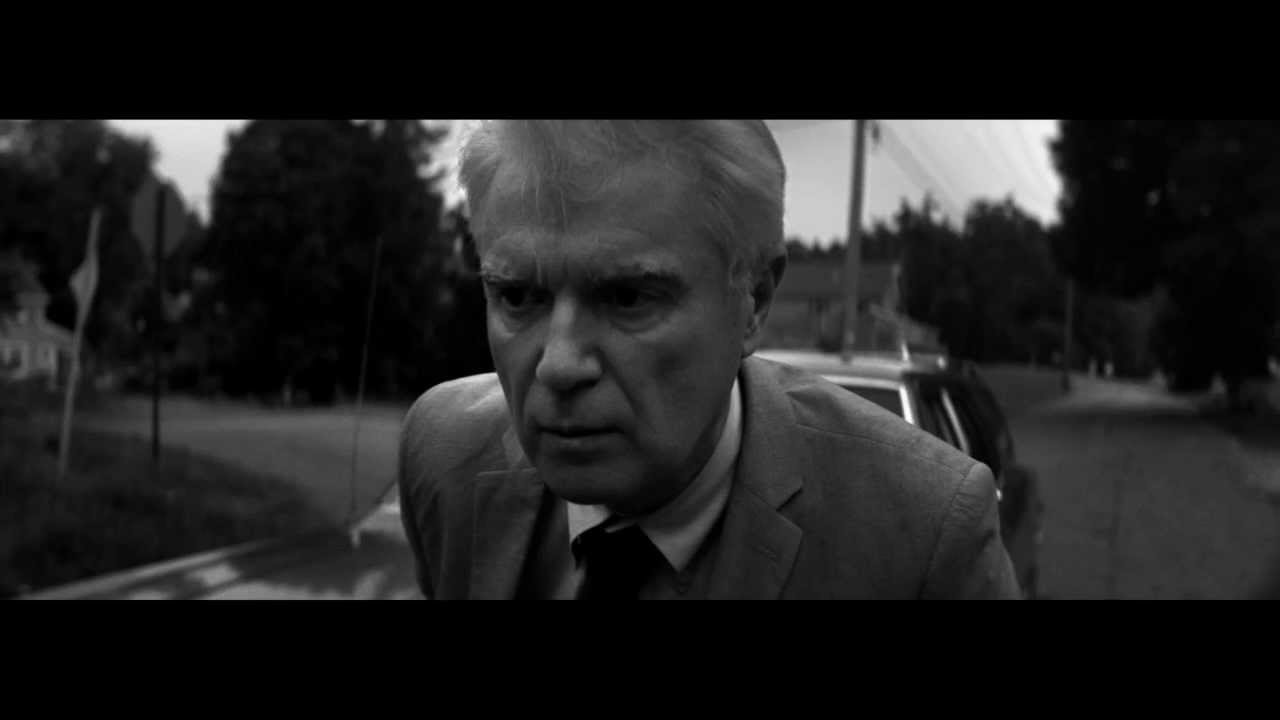Photograph courtesy of Renata Raksha
It’s November 2011 and due to the fortuitous timing of a brief business trip to Pennsylvania, I find myself at the cavernous Union Transfer music venue in the fine city of Philadelphia. Previously an enormous Italian restaurant (‘Spaghetti Warehouse’ must have dished out tons and tons of the stuff on a good night), I’ve lucked out big time. Annie Clark is onstage showcasing her third St. Vincent album, Strange Mercy, and she’s on extraordinary form. The songs seethe and snarl as they mutate away from the recorded versions into masterful slugs of rock viscera. At one point, Clark – a head full of bobbing curls and resplendent in a knee-length leather coat – strikes a guitar pose and I’m hurtled back in time to a 1987 gig in Rotterdam and Prince at his very finest on the Sign O’ The Times tour.
She’s that good.
Fast-forward two years and I’m listening to a stream of Annie’s fourth album, the underwhelmingly-titled St. Vincent. I’m hooked from the first note – the opening ‘Rattlesnake’ is twisted, metallic funk and a true story about Clark coming face-to-face with a rattler during a naked walk in the Texan desert. Even on the initial listen, it’s obvious that St. Vincent is the work of an artist operating on full power.
And St. Vincent is a wonderfully unexpected gift. Clark toured Strange Mercy for over a year and then went straight into 2012’s Love This Giant project with David Byrne. After touring with Byrne, and as opposed to taking any battery-recharging time out, Clark decided – after a mere 36 hours of rest – to get straight back into writing the songs that would form St. Vincent.
Building on the Byrne collaboration, St. Vincent is an album built around beats and rhythmic contortions (both Dap-Kings’ Homer Steinweiss and Midlake drummer McKenzie Smith share stick duties) and is, despite some truly psychedelic electronica, the most accessible St. Vincent record to date. ‘Psychopath’ is Bowie-flecked space pop, while ‘Huey Newton’ is late-night slinky soul before a trademark Clark guitar solo shatters and shakes. Another track, a bonkers mind-fuck called ‘Bring Me Your Loves’, actually makes me gasp out loud, alone in my tiny office.
When I speak to Annie – at some unearthly early hour on a Monday morning – she politely endures my gushing praise for St. Vincent. I’m aware as my mouth is moving that it’s unlikely she gives a flying fuck about what I think of her new album. But, I tell her anyway. Annie is a fascinating interviewee – she has lost any traces of a Texan drawl and speaks slowly in carefully thought-out sentences – and an expert at the ‘album promo interview’ game. Annie already has a strapline – she tells me she wanted to make "a party record that could be played at a funeral". She’s succeeded – St. Vincent is a record for the heart as well as the hips.
The Strange Mercy and Love This Giant tours lasted almost 18 months. What happens when you finish such an extensive and intensive schedule?
Annie Clark: I think if you ask most musicians they will talk about a kind of post-tour depression. You drop down to earth after a year-and-a-half of a tornado and think, "Where am I?" and "Where are all of my friends that I was with for the past 18 months?" and "Why isn’t someone telling me when to eat dinner?" as there is a certain amount of structure that the road gives you, that you won’t have if you don’t have a day job.
How did you deal with your post-tour comedown?
AC: I got back from the Love This Giant tour and I called friends and family and told them I needed a little time to decompress and understand what life can be like off the road, and that I needed them to give me a little space. But, within 36 hours I had started writing this new record – I didn’t really take the kind of time off that I thought I was going to in order to do things like ‘a normal person’ or learn how to be in one place. I realised that I don’t care about being a normal person or being in one place. I just want to make music and make hay while the sun shines.
That’s quite a conclusion to come to in a day-and-a-half.
AC: Well, I had a year-and-a-half’s worth or more of ideas and melodies – things that I really did want to synthesise. When I am on the road it’s not a time that I can write – I’m in tour mode. I had so much to say that it was more therapeutic to get right back in immediately and say whatever came out, and not judge it or worry about it. There was no pressure – it wasn’t like anyone was on my back to get another record out. I don’t think anyone was expecting a record so soon, so, in that way, I was able to write for a good many months with a feeling of abandon.
What impact did that "feeling of abandon" have on your songwriting?
AC: I was more confident than in anything I had ever done. I don’t want to say it was an effortless process and it took a lot of effort. When I sit down to write a record I approach it a little bit like I have heard Nick Cave does, which is to work from ten until seven every day – like a day job. So, it wasn’t effortless in the sense that I did spend an incredible amount of time crafting the songs but it was freer and easier than previous records.
The new album seems to place a greater emphasis on beats and rhythms that any of your previous work. Why was this?
AC: On the Strange Mercy tour I had seen songs off that album really come to life and get heavier than on the record. Also, I started stage-diving at shows more and more. Things had gotten more heightened and visceral. Then I toured with David and we played songs together – Love This Giant songs and also David Byrne songs – where people were getting up and dancing and I had never really played in a band where the audience was really dancing. I wanted to bring that kind of energy onto the record. I wanted to make a party record you could play at a funeral. What I mean by that is a record with enough bounce and kinetic energy that people could be moved to dance, but with enough heart and pathos that you could have it in your most vulnerable and horrible moments.
How has working with David Byrne impacted on you as an artist?
AC: The thing that working with David did was that he is a very fearless person and I think any time you are around truly fearless people it is so inspiring. I think I tried to take some of that and approached my writing with a lot of fearlessness. I felt like I had proved a certain amount of things on previous records and this record wasn’t necessarily about proving anything. There are things you think about early in your career – "I need to show people I am a musician" or whatever hang-ups you may have – but I just didn’t have any of that on this record. I just wanted to write great songs and do things, which were, to me, pushing the envelope of what pop music could be.
I love the idea of artists exploring how pop music can be presented in new ways – it seems like the ultimate goal.
AC: That’s always where I am interested. I think that I make pop music and I don’t mean "pop music" as dirty words. I love pop music. It’s always the most interesting place – this weird world where music is accessible and likeable but cloaked in things that are strange and left field. That’s the realm where I naturally gravitate towards, and that’s the realm that I really, really want to cultivate and have done even more on this record.
Once again John Congleton has produced the album. What is it about John that enables you to work so well together?
AC: John and I are both from Dallas, Texas. There is a specific energy of kids who grew up in the suburbs of Dallas in the 80s and 90s. It is the perfect catalyst for a specific kind of freak – a freak who is quite down-to-earth, because it is Texas, but has to cultivate a sick sense of humour in the face of a very conservative environment. So, I don’t know what it is specifically – I’m rambling about what I am pontificating about! – that makes a Texas freak different from a California freak or whatever, but that’s the thing that conjoins John and I. That’s why we make a great collaboration. I just know where he is coming from and he really knows where I am coming from at a gut/root level. And, we have a great time in the studio – we basically just try and make each other laugh. I think that keeps the process very fluid.
Can we talk about some of the songs from the new album? I’m particularly loving ‘Bring Me Your Loves’, ‘Huey Newton’ and ‘Rattlesnake’ on the first few listens.
AC: Oh, you like the weird ones.
Ha. Yes – but how do you even dream up a song like ‘Bring Me Your Loves’? Do you listen to other types of music when you are writing?
AC: I do listen to music while I am writing. I don’t necessarily listen to things that I like that much. I will have a melodic thing that will remind me of another song and I will go and explore that. For ‘Bring Me Your Loves’ I was listening to Turkish folk music and Pantera.
Jeepers.
AC: [laughs] That might explain a lot. On that song John and I decided to use a groove based on [tracks by] The Meters to get a New Orleans-like rhythm section. The song is bananas – I love it.
I’m assuming the lyrics of ‘Digital Witness’ explore the psychological impact on a generation of people whose lives are captured at every moment via a need to feed social networks. Is that correct?
AC: Yes. Anything that knows it is being watched changes its behaviour. We are now so accustomed to documenting ourselves and so aware that we are being watched and I think psychologically that takes a strange toll, which is going to show itself more and more as we progress. In some cases, we have this total connectivity via the internet but if we are not careful it can actually disconnect us more than we know. I’m curious as to what that is going to lead to.
There are literally only about five photos of me during my college years – which was probably a good thing.
AC: Quite. It’s the fact that we cannot just have a meal – a nice, quiet private meal – and that we have to take a picture of the food and put it on Instagram and make sure we get a round of tiny applause, and then maybe make a Facebook post about how good we feel afterwards, and then go on Yelp and recommend the restaurant, makes this a strange time we are living in. I’m not arguing to be a Luddite or anything like that, I’m just asking the questions about, "Where are we now?" and "Where are we going?"
I believe ‘Rattlesnake’ recalls a true story. Just how close did you get to the snake and why were you naked?
AC: It was terrifying. The snake was probably five feet from me. The song is actually very literal – there is no flowery language or embellishment of the story. This is what happened – I was walking along in the Texan desert and decided to take my clothes off because it felt really free and there was no one around for miles and miles, and all of a sudden I heard a rattle and saw the snake out of the corner of my eye. I took off and ran back many miles to the house.
We don’t have rattlesnakes in the UK. Is that the official line on what to do if you meet one – run like hell?
AC: Yeah, you just run like hell. The other point of that story is that I don’t know anything about snakes or nature. I do not have any nature survival skills. I’m so disconnected from that. So, the story sounded like a new kind of creation myth – where you don’t come from anybody’s rib – and that you are actually alone in the world, which seems more appropriate. It seemed that the record had to start with a creation myth. Everything starts with a creation myth.
I’m also loving ‘Huey Newton’. I’m assuming it refers to the Huey Newton who was a founder member of the Black Panthers? Why did you write a song about him?
AC: I was travelling a lot on the Strange Mercy tour and had gotten prescribed to Ambien to get over jet lag. I was in Helsinki and decided to take an Ambien as I wasn’t playing until the next day. I needed sleep so badly. I took a whole Ambien and with that drug, if you go to bed you sleep like a baby. But, if you take it and for some reason don’t fall asleep you can have these really strange hallucinations – not necessarily visual and tracers and all that – but your mind can go to that place that is kind of in between waking and sleep. So, I had this experience where I was in my hotel room, high as a kite on Ambien, and I felt like Huey Newton was there and we had this moment of understanding between us. I realised I had to write him into a song. So I did.
I see you now as a really established artist. As your career has developed, do you have different expectations ahead of an album release?
AC: I don’t sit with pie charts and think about expectations in terms of numbers or the Billboard charts. Obviously you put out a record and absolutely hope for the best and I hope that fans like it. But, my primary concern is music. That sounds sort of "Duh!" but I think that as you slowly trek up the mountain it can be hard for some people to keep hold of that and not just think, "We will just make it a little vanilla here and add a little sugar there so that maybe the Radio Gods will smile on our project." I think I would rather the mainstream bends its ear to what I am doing than me do a back-bend to the mainstream. The people who are my heroes have always managed to do that and live on this axis of accessible pop music and also in the lunatic fringe.
Those types of artists are very few and far between. That’s why they are so precious.
AC: Indeed. My hope is that people can really connect to the album and not just as a pleasant record to put on in the background but that it can move people’s hearts too. The need for pathos – the fact that every song has to have a heartbeat and a soul – has become more and more clear to me.
St. Vincent is out on February 24 2014 via Loma Vista/Caroline International, with a European tour starting on February 13; head to St. Vincent’s website for full details





